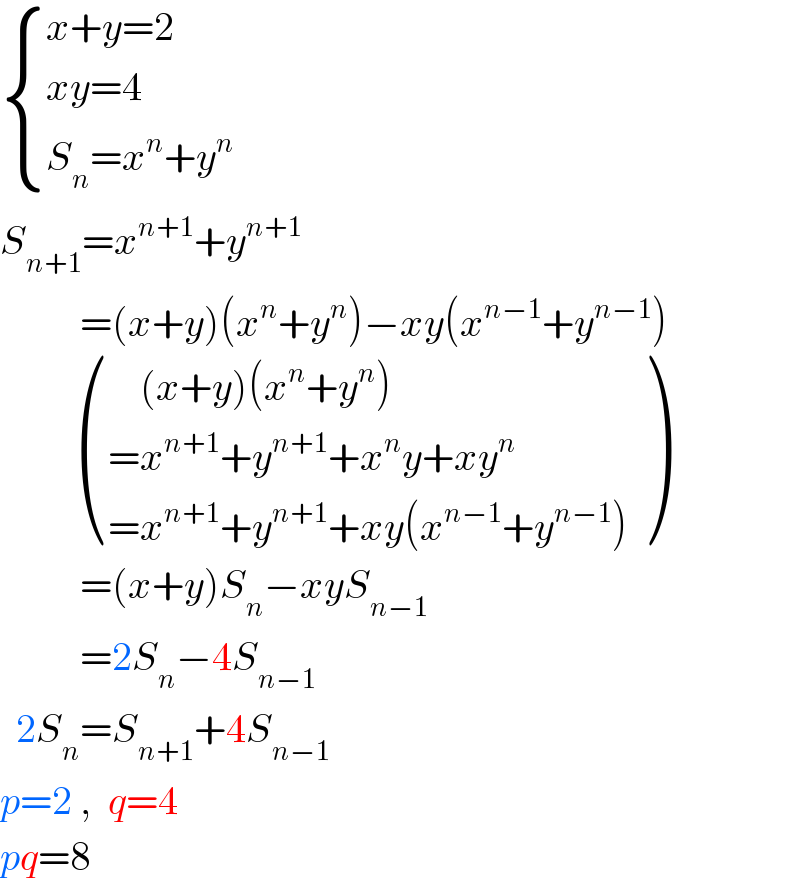
Question Number 7102 by Tawakalitu. last updated on 10/Aug/16

Commented by 123456 last updated on 10/Aug/16

$${S}_{\mathrm{0}} =\mathrm{2} \\ $$$${S}_{\mathrm{1}} =\mathrm{2} \\ $$
Commented by prakash jain last updated on 10/Aug/16
![x+y=2 xy=4 (x+y)^2 −4xy=(x−y)^2 =4−16=−12 x−y=2(√3)i x=1+i(√3)=2e^(iπ/3) y=1−i(√3)=2e^(−iπ/3) x^n +y^n =2^n e^(inπ/3) +2^n e^(−inπ/3) =2^(n+1) cos ((nπ)/3) S_(n+1) =2^(n+2) cos (((n+1)π)/3) S_(n−1) =2^n cos (((n−1)π)/3) S_(n+1) +4S_(n−1) =2^(n+2) [cos (((n+1)π)/3)+cos (((n−1)π)/3)] =2^(n+2) [2cos ((nπ)/3)cos (π/3)]=2^(n+3) cos ((nπ)/3)=4[2^(n+1) cos ((nπ)/3)] =2[2^(n+1) cos ((nπ)/3)×(1/2)]=2S_n](Q7104.png)
$${x}+{y}=\mathrm{2} \\ $$$${xy}=\mathrm{4} \\ $$$$\left({x}+{y}\right)^{\mathrm{2}} −\mathrm{4}{xy}=\left({x}−{y}\right)^{\mathrm{2}} =\mathrm{4}−\mathrm{16}=−\mathrm{12} \\ $$$${x}−{y}=\mathrm{2}\sqrt{\mathrm{3}}{i} \\ $$$${x}=\mathrm{1}+{i}\sqrt{\mathrm{3}}=\mathrm{2}{e}^{{i}\pi/\mathrm{3}} \\ $$$${y}=\mathrm{1}−{i}\sqrt{\mathrm{3}}=\mathrm{2}{e}^{−{i}\pi/\mathrm{3}} \\ $$$${x}^{{n}} +{y}^{{n}} =\mathrm{2}^{{n}} {e}^{{in}\pi/\mathrm{3}} +\mathrm{2}^{{n}} {e}^{−{in}\pi/\mathrm{3}} =\mathrm{2}^{{n}+\mathrm{1}} \mathrm{cos}\:\frac{{n}\pi}{\mathrm{3}} \\ $$$${S}_{{n}+\mathrm{1}} =\mathrm{2}^{{n}+\mathrm{2}} \mathrm{cos}\:\frac{\left({n}+\mathrm{1}\right)\pi}{\mathrm{3}} \\ $$$${S}_{{n}−\mathrm{1}} =\mathrm{2}^{{n}} \mathrm{cos}\:\frac{\left({n}−\mathrm{1}\right)\pi}{\mathrm{3}} \\ $$$${S}_{{n}+\mathrm{1}} +\mathrm{4}{S}_{{n}−\mathrm{1}} =\mathrm{2}^{{n}+\mathrm{2}} \left[\mathrm{cos}\:\frac{\left({n}+\mathrm{1}\right)\pi}{\mathrm{3}}+\mathrm{cos}\:\frac{\left({n}−\mathrm{1}\right)\pi}{\mathrm{3}}\right] \\ $$$$=\mathrm{2}^{{n}+\mathrm{2}} \left[\mathrm{2cos}\:\frac{{n}\pi}{\mathrm{3}}\mathrm{cos}\:\frac{\pi}{\mathrm{3}}\right]=\mathrm{2}^{{n}+\mathrm{3}} \mathrm{cos}\:\frac{{n}\pi}{\mathrm{3}}=\mathrm{4}\left[\mathrm{2}^{{n}+\mathrm{1}} \mathrm{cos}\:\frac{{n}\pi}{\mathrm{3}}\right] \\ $$$$=\mathrm{2}\left[\mathrm{2}^{{n}+\mathrm{1}} \mathrm{cos}\:\frac{{n}\pi}{\mathrm{3}}×\frac{\mathrm{1}}{\mathrm{2}}\right]=\mathrm{2}{S}_{{n}} \\ $$
Commented by Tawakalitu. last updated on 10/Aug/16

$${I}\:{really}\:{appreciate}\:{your}\:{effort},\:{thank}\:{you}\:{so}\:{much} \\ $$
Commented by Tawakalitu. last updated on 10/Aug/16

$${Workings}\:{please} \\ $$
Commented by Tawakalitu. last updated on 10/Aug/16

$${please}\:{edit}\:{your}\:{wotkings}\:{and}\:{show}\:{how}\:{p}\:=\:\mathrm{4},\:{q}\:=\:\mathrm{4}.\:{thanks}\: \\ $$
Commented by Yozzii last updated on 10/Aug/16
![Check your second to last line of text. 2^(n+2) [2cos((nπ)/3)cos(π/3)]=2^(n+2) [2cos((nπ)/3)×(1/2)]=2×2^(n+1) cos((nπ)/3) ⇒p=2 ∴ pq=8](Q7111.png)
$${Check}\:{your}\:{second}\:{to}\:{last}\:{line}\:{of}\:{text}. \\ $$$$\mathrm{2}^{{n}+\mathrm{2}} \left[\mathrm{2}{cos}\frac{{n}\pi}{\mathrm{3}}{cos}\frac{\pi}{\mathrm{3}}\right]=\mathrm{2}^{{n}+\mathrm{2}} \left[\mathrm{2}{cos}\frac{{n}\pi}{\mathrm{3}}×\frac{\mathrm{1}}{\mathrm{2}}\right]=\mathrm{2}×\mathrm{2}^{{n}+\mathrm{1}} {cos}\frac{{n}\pi}{\mathrm{3}} \\ $$$$\Rightarrow{p}=\mathrm{2}\:\therefore\:{pq}=\mathrm{8} \\ $$
Commented by prakash jain last updated on 10/Aug/16

$$\mathrm{Thanks}.\:\mathrm{Corrected}. \\ $$
Commented by prakash jain last updated on 10/Aug/16

$$\mathrm{Please}\:\mathrm{see}\:\mathrm{last}\:\mathrm{three}\:\mathrm{lines}\:\mathrm{for}\:\mathrm{relation} \\ $$$$\mathrm{between}\:{S}_{{n}+\mathrm{1}} ,\:{S}_{{n}−\mathrm{1}} \:{and}\:{S}_{{n}} \\ $$
Commented by Tawakalitu. last updated on 10/Aug/16

$${Seen}\:{thanks}\:{so}\:{much},\:{i}\:{can}\:{understand}\:{now} \\ $$
Answered by prakash jain last updated on 10/Aug/16

$${p}=\mathrm{2} \\ $$$${q}=\mathrm{4} \\ $$$${pq}=\mathrm{16} \\ $$
Commented by Tawakalitu. last updated on 10/Aug/16

$${Workings}\:{please}\: \\ $$
Commented by Yozzii last updated on 10/Aug/16

$${p}=\mathrm{2},\:{q}=\mathrm{4},\:{pq}=\mathrm{8} \\ $$
Answered by nume1114 last updated on 12/Aug/16

$$\begin{cases}{{x}+{y}=\mathrm{2}}\\{{xy}=\mathrm{4}}\\{{S}_{{n}} ={x}^{{n}} +{y}^{{n}} }\end{cases} \\ $$$${S}_{{n}+\mathrm{1}} ={x}^{{n}+\mathrm{1}} +{y}^{{n}+\mathrm{1}} \\ $$$$\:\:\:\:\:\:\:\:\:\:=\left({x}+{y}\right)\left({x}^{{n}} +{y}^{{n}} \right)−{xy}\left({x}^{{n}−\mathrm{1}} +{y}^{{n}−\mathrm{1}} \right) \\ $$$$\:\:\:\:\:\:\:\:\:\begin{pmatrix}{\:\:\:\:\left({x}+{y}\right)\left({x}^{{n}} +{y}^{{n}} \right)}\\{={x}^{{n}+\mathrm{1}} +{y}^{{n}+\mathrm{1}} +{x}^{{n}} {y}+{xy}^{{n}} }\\{={x}^{{n}+\mathrm{1}} +{y}^{{n}+\mathrm{1}} +{xy}\left({x}^{{n}−\mathrm{1}} +{y}^{{n}−\mathrm{1}} \right)}\end{pmatrix} \\ $$$$\:\:\:\:\:\:\:\:\:\:=\left({x}+{y}\right){S}_{{n}} −{xyS}_{{n}−\mathrm{1}} \\ $$$$\:\:\:\:\:\:\:\:\:\:=\mathrm{2}{S}_{{n}} −\mathrm{4}{S}_{{n}−\mathrm{1}} \\ $$$$\:\:\mathrm{2}{S}_{{n}} ={S}_{{n}+\mathrm{1}} +\mathrm{4}{S}_{{n}−\mathrm{1}} \\ $$$${p}=\mathrm{2}\:,\:\:{q}=\mathrm{4} \\ $$$${pq}=\mathrm{8} \\ $$
Commented by Rasheed Soomro last updated on 12/Aug/16

$${Very}\:{Nice}! \\ $$
